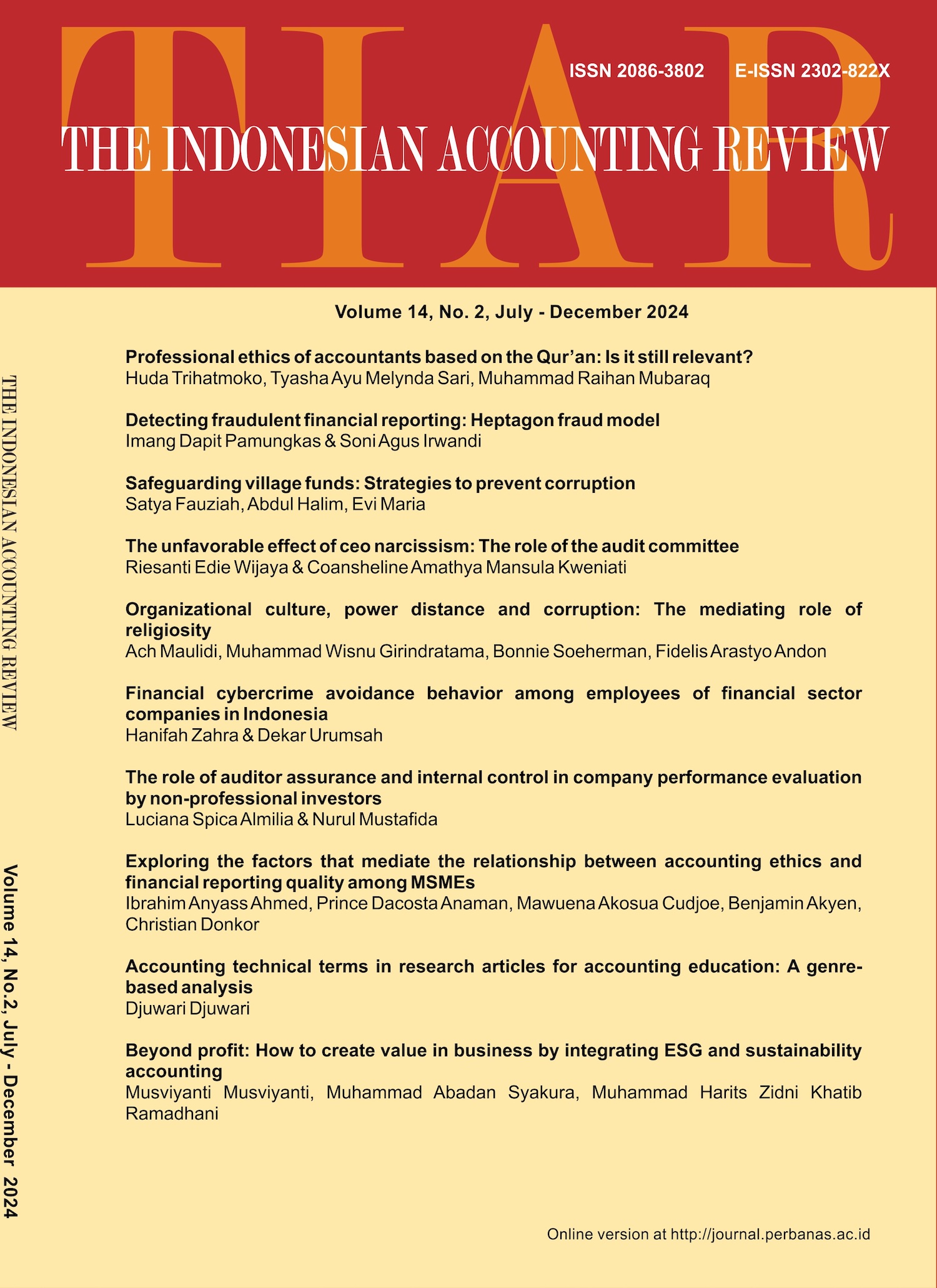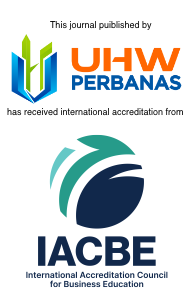Exploring the factors that mediate the relationship between accounting ethics and financial reporting quality among MSMEs
DOI:
https://doi.org/10.14414/tiar.v14i2.4711Keywords:
Accounting ethics, Financial reporting quality, Ethical leadership, MSMEs, Developing countryAbstract
This study aims to investigate the impact of accounting ethics on the quality of financial reporting of MSMEs in Ghana, a sector vital to economic stability. Given the critical role of MSMEs in the Ghanaian economy, there is an urgent need to establish ethical financial practices that promote transparency and sustainability in the sector.Using Stakeholder Theory, thisstudy specifically examines how variables of ethical leadership, employee motivation, training and education, regulatory environment, technology solutions, and internal controls affect this relationship.Data were collected from 368 participants in 100 MSMEs from the Central Region of Ghana using a quantitative approach and a standardized questionnaire based on a five-point Likert scale. The main analytical tool for data analysis is Structural Equation Modeling (SEM) with SMART PLS 4. The results of this study indicate that accounting ethics has a significant effect on the quality of financial reporting of MSMEs in Ghana. Ethical leadership, training and education, and employee motivation significantly mediate the relationship between accounting ethics and financial reporting quality of MSMEs in Ghana.Meanwhile, internal control, technology solutions, and regulatory environment do not significantly mediate the relationship between accounting ethics and financial reporting quality of MSMEs in Ghana. This study offers useful insights into the significance of accounting ethics in improving the integrity of financial reporting of MSMEs in Ghana.
References
Abed, I. A., Hussin, N., Haddad, H., Almubaydeen, T. H., & Ali, M. A. (2022). Creative accounting determination and financial reporting quality: the integration of transparency and disclosure. Journal of Open Innovation: Technology, Market, and Complexity, 8(1), 38-46.
Aboagye‐Otchere, F., & Agbeibor, J. (2012). The International Financial Reporting Standard for Small and Medium‐sized Entities (IFRS for SMES): suitability for small businesses in Ghana. Journal of Financial Reporting and Accounting, 10(2), 190–214.
Adegboyegun, A. E., Ben-Caleb, E., Ademola, A. O., Oladutire, E. O., & Sodeinde, G. M. (2020). Internal control systems and operating performance: Evidence from small and medium enterprises (SMEs) in Ondo state. Asian Economic and Financial Review, 10(4), 469-479.
Adhariani, D., & De Villiers, C. (2019). Integrated reporting: perspectives of corporate report preparers and other stakeholders. Sustainability Accounting, Management and Policy Journal, 10(1), 126–156.
Ageeva, O., Karp, M., & Sidorov, A. (2020). The application of digital technologies in financial reporting and auditing. Institute of Scientific Communications Conference, 1526–1534.
Agwor, T. C., & Okafor, R. (2018). Accounting Ethics and Financial Reporting Quality of Tourism and Hospitality Firms in Rivers State. Journal of Accounting and Financial Management, 4(3), 1–14.
Agyei-Mensah, B. K. (2018). Impact of corporate governance attributes and financial reporting lag on corporate financial performance. African Journal of Economic and Management Studies, 9(3), 349–366.
Ahmed, I. A., Anaman, P. D., Aidoo, E., & Dzakah, G. A. (2022). Accountant Competence and Independence in Providing Accountancy Services to Small and Medium-Sized Entities: Evidence from a Developing Economy Perspective. East African Journal of Business and Economics, 5(2), 53–67. https://doi.org/10.37284/eajbe.5.2.1043.
Akisik, O., & Gal, G. (2017). The impact of corporate social responsibility and internal controls on stakeholders’ view of the firm and financial performance. Sustainability Accounting, Management and Policy Journal, 8(3), 246–280.
Al-Shaer, H., Salama, A., & Toms, S. (2017). Audit committees and financial reporting quality: Evidence from UK environmental accounting disclosures. Journal of Applied Accounting Research, 18(1), 2–21.
Al Halbusi, H., Williams, K. A., Ramayah, T., Aldieri, L., & Vinci, C. P. (2021). Linking ethical leadership and ethical climate to employees’ ethical behavior: the moderating role of person–organization fit. Personnel Review, 50(1), 159–185.
Ali Awad, N. H., & Al-anwer Ashour, H. M. (2022). Crisis, ethical leadership and moral courage: Ethical climate during COVID-19. Nursing Ethics, 29(6), 1441–1456.
Alsayegh, M. F., Abdul Rahman, R., & Homayoun, S. (2020). Corporate economic, environmental, and social sustainability performance transformation through ESG disclosure. Sustainability, 12(9), 1-10.
Amanamah, R. B. (2017). Benefits and Challenges of International Financial Reporting Standards Adoption in Ghana : Accounts and Business Managers ’ Perspective. 7(2), 178–193. https://doi.org/10.5296/ijafr.v7i2.12040.
Amissah, E., Hammond, P., & Djimatey, R. (2020). The effects of international financial reporting standards on reporting quality of financial institutions in Ghana. International Journal of Accounting and Financial Reporting, 10(2), 94–118.
Anaman, P. D., Ahmed, I. A., Suleman, A.-R., & Dzakah, G. A. (2023). Environmentally Sustainable Business Practices in Micro, Small, and Medium Enterprises: A Sub-Saharan African Country Perspective. Business Perspectives and Research, 1–16. https://doi.org/10.1177/22785337231162740.
Anning-Dorson, T. (2021). Organizational culture and leadership as antecedents to organizational flexibility: implications for SME competitiveness. Journal of Entrepreneurship in Emerging Economies, Journal of Entrepreneurship in Emerging Economies, 13(5), 1309-1325.
Appiah, K. O., Awunyo-Vitor, D., Mireku, K., & Ahiagbah, C. (2016). Compliance with international financial reporting standards: the case of listed firms in Ghana. Journal of Financial Reporting and Accounting, 14(1), 131–156.
Apreku-Djana, P. K., Ayittah, S. K., Apreku, I. K. O., Ameyaw, F., & Opare, E. A. (2023). The Mediating Effect of Corporate Social Responsibility and Corporate Accountability in the Relationship between Corporate Governance and Value-Based Financial Performance of Banks. International Journal of Business, 28(2), 1–36.
Ashiagbor, A., Ayamga, A. T., & Adzagbre, C. K. (2020). Internal Control Systems and Performance of Life Insurers: Ghanaian Case. Research Journal of Finance and Accounting, 11(18), 92–100.
Awang, Y., Abdul Rahman, A. R., & Ismail, S. (2019). The influences of attitude, subjective norm and adherence to Islamic professional ethics on fraud intention in financial reporting. Journal of Islamic Accounting and Business Research, 10(5), 710–725.
Boateng, R. N., Tawiah, V., & Tackie, G. (2022). Corporate governance and voluntary disclosures in annual reports: a post-International Financial Reporting Standard adoption evidence from an emerging capital market. International Journal of Accounting & Information Management, 30(2), 252–276. https://doi.org/10.1108/IJAIM-10-2021-0220.
Carsamer, E., & Abbam, A. (2023). Religion and tax compliance among SMEs in Ghana. Journal of Financial Crime, 30(3), 759–775.
Cohen, J. R., Krishnamoorthy, G., Peytcheva, M., & Wright, A. M. (2013). How does the strength of the financial regulatory regime influence auditors’ judgments to constrain aggressive reporting in a principles-based versus rules-based accounting environment? Accounting Horizons, 27(3), 579–601.
Colvin, R. M., Witt, G. B., & Lacey, J. (2020). Power, perspective, and privilege: The challenge of translating stakeholder theory from business management to environmental and natural resource management. Journal of Environmental Management, 271, 110974.
Connelly, L. M. (2016). Cross-sectional survey research. Medsurg Nursing, 25(5), 369.
Dechow, P. M., Sloan, R. G., & Sweeney, A. P. (1996). Causes and consequences of earnings manipulation: An analysis of firms subject to enforcement actions by the SEC. Contemporary Accounting Research, 13(1), 1–36.
Dey, M., Bhattacharjee, S., Mahmood, M., Uddin, M. A., & Biswas, S. R. (2022). Ethical leadership for better sustainable performance: Role of employee values, behavior and ethical climate. Journal of Cleaner Production, 337, 130527.
Dumitru, M., Dyduch, J., Gu’e, R.-G., & Krasodomska, J. (2017). Corporate reporting practices in Poland and Romania–an ex-ante study to the new non-financial reporting European directive. Accounting in Europe, 14(3), 279–304.
Elghuweel, M. I., Ntim, C. G., Opong, K. K., & Avison, L. (2017). Corporate governance, Islamic governance and earnings management in Oman: A new empirical insights from a behavioural theoretical framework. Journal of Accounting in Emerging Economies, 7(2), 190–224.
Etim, E. O., Daferighe, E. E., & UKPONG, M. O. (2020). Financial Reporting Practices and Sustainability of Micro Small and Medium Enterprises (MSMEs) in Akwa Ibom State. East African Scholars Journal of Economics, Business and Management, 3(12), 920-940.
Gunz, S., & Thorne, L. (2020). Thematic symposium: The impact of technology on ethics, professionalism and judgement in accounting. Journal of Business Ethics, 167, 153–155.
Hammond, P., & Opoku, M. O. (2023). The mediating effect of going concern and corporate reporting in the relationship between corporate governance and investor confidence in financial institutions. Heliyon, 9(10), 1-12.
Hasan, A., Aly, D., & Hussainey, K. (2022). Corporate governance and financial reporting quality: a comparative study. Corporate Governance: The International Journal of Business in Society, 22(6), 1308–1326.
Jaijairam, P. (2017). Ethics in accounting. Journal of Finance and Accountancy, 23, 1–13.
Katmon, N., & Farooque, O. Al. (2017). Exploring the impact of internal corporate governance on the relation between disclosure quality and earnings management in the UK listed companies. Journal of Business Ethics, 142, 345–367.
Kermis, G. F., & Kermis, M. D. (2014). Financial reporting regulations, ethics and accounting education. Journal of Academic and Business Ethics, 8, 1-10.
Kim, M.-S., & Thapa, B. (2018). Relationship of ethical leadership, corporate social responsibility and organizational performance. Sustainability, 10(2), 1-12.
Kuhl, J. (2021). The expectancy-value approach within the theory of social motivation: Elaborations, extensions, critique. Expectations and Actions, 125–160.
Kumar, M., Raut, R. D., Mangla, S. K., Ferraris, A., & Choubey, V. K. (2022). The adoption of artificial intelligence powered workforce management for effective revenue growth of micro, small, and medium scale enterprises (MSMEs). Production Planning & Control, 1–17.
Kurniawati, S., & Sulaeman, A. (2022). The influence of stakeholder engagement and transformational leadership on business sustainability. Jurnal Bisnis Dan Manajemen, 23(1), 45–65.
Lackson, B., & Muba, S. (2021). Factors affecting the adoption of financial reporting standards by micro, small and medium enterprises in Tanzania: The case of mbeya city council. East African Journal of Business and Economics, 4(1), 46–61.
Lumpkin, A., & Achen, R. M. (2018). Explicating the synergies of self‐determination theory, ethical leadership, servant leadership, and emotional intelligence. Journal of Leadership Studies, 12(1), 6–20.
Madawaki, A., Ahmi, A., & Ahmad, H. N. (2022). Internal audit functions, financial reporting quality and moderating effect of senior management support. Meditari Accountancy Research, 30(2), 342–372.
Mbawuni, J. (2019). Assessing financial reporting quality of listed companies in developing countries: evidence from Ghana. International Journal of Economics and Finance, 11(9), 1–29.
Mbir, D. E. G., Agyemang, O. S., Tackie, G., & Abeka, M. J. (2020). IFRS compliance, corporate governance and financial reporting quality of GSE-listed non-financial firms. Cogent Business & Management, 7(1), 1-10. https://doi.org/10.1080/23311975.2020.1759856.
Metwally, D., Ruiz-Palomino, P., Metwally, M., & Gartzia, L. (2019). How ethical leadership shapes employees’ readiness to change: The mediating role of an organizational culture of effectiveness. Frontiers in Psychology, 10, 1-12.
Nielsen, H., & Andersen, I. (2024). Embracing the Future: Strategies and Insights for Successful Digital Accounting Implementation. Journal of Economic and Business Studies, 6(1), 1–6.
Nyakundi, D. O., Nyamita, M. O., & Tinega, T. M. (2014). Effect of internal control systems on financial performance of small and medium scale business enterprises in Kisumu City, Kenya. International Journal of Social Sciences and Entrepreneurship, 1(11), 719–734.
Oppong, C., & Bruce-Amartey, A. (2022). International Financial Reporting Standards, Board Governance, and Accounting Quality: Preliminary Evidence from Ghana. Journal of Accounting, 15(2), 27–40.
Osafo, E., Paros, A., & Yawson, R. M. (2021). Valence–instrumentality–expectancy model of motivation as an alternative model for examining ethical leadership behaviors. Sage Open, 11(2), 1-10.
Padi, A., & Musah, A. (2022). The influence of corporate governance practices on financial performance of small and medium-sized enterprises in Ghana. The Indonesian Journal of Accounting Research, 25(2), 249–270.
Perera, D. (2016). Adoption of international financial reporting standards (IFRS) for small and medium-sized enterprises (SMEs): problems and challenges. Disertation. Macquarie University.
Perera, D., & Chand, P. (2015). Issues in the adoption of international financial reporting standards (IFRS) for small and medium-sized enterprises (SMES). Advances in Accounting, 31(1), 165–178.
Phornlaphatrachakorn, K., & Kalasindhu, K. N. (2021). Digital accounting, financial reporting quality and digital transformation: evidence from Thai listed firms. Journal of Asian Finance, 8(8), 409–419.
Preacher, K. J., & Hayes, A. F. (2008). Asymptotic and resampling strategies for assessing and comparing indirect effects in multiple mediator models. Behavior Research Methods, 40(3), 879–891.
Rae, K., Sands, J., & Subramaniam, N. (2017). Associations among the five components within COSO internal control-integrated framework as the underpinning of quality corporate governance. Australasian Accounting, Business and Finance Journal, 11(1), 28–54.
Rusconi, G., & Contrafatto, M. (2019). Stakeholder Theory, Accounting, and Business Legitimacy. Handbook of Business Legitimacy Springer Nature.
Sappor, P., Atta Sarpong, F., & Ahmed Seidu Seini, R. (2023). The adoption of IFRS for SMEs in the northern sector of Ghana: A case of structural equation modeling. Cogent Business & Management, 10(1), 2180840. https://doi.org/10.1080/23311975.2023.2180840.
Sarfo, C. A., Zhang, J. A., O’Kane, P., Podgorodnichenko, N., & Osei-Fosu, K. K. (2022). Perceived corporate social responsibility and employee ethical behaviour: do employee commitment and co-worker ethicality matter? Journal of Management & Organization, 28(1), 184–201.
Seifert, S. G., LaMothe, E. G., & Schmitt, D. B. (2023). Perceptions of the ethical infrastructure, professional autonomy, and ethical judgments in accounting work environments. Journal of Business Ethics, 182(3), 821–850.
Setiyawati, H., & Doktoralina, C. (2019). The importance of quality accounting information management in regional governments in Indonesia. Management Science Letters, 9(12), 2083–2092.
Taiwo, O. S., Hakan, A., & Savaş, Ç. (2022). Modeling the impacts of MSMEs’ contributions to GDP and their constraints on unemployment: the case of African’s most populous country. Studies in Business and Economics, 17(1), 154–170.
Tawiah, V., & Gyapong, E. (2023). International financial reporting standards, domestic debt finance and institutional quality: Evidence from developing countries. International Journal of Finance & Economics, 28(3), 2915–2936.
Tetteh, L. A., Kwarteng, A., Aveh, F. K., Dadzie, S. A., & Asante-Darko, D. (2022). The impact of internal control systems on corporate performance among listed firms in Ghana: The moderating role of information technology. Journal of African Business, 23(1), 104–125.
Turzo, T., Marzi, G., Favino, C., & Terzani, S. (2022). Non-financial reporting research and practice: Lessons from the last decade. Journal of Cleaner Production, 345, 131154.
VanSandt, C. V, Shepard, J. M., & Zappe, S. M. (2006). An examination of the relationship between ethical work climate and moral awareness. Journal of Business Ethics, 68, 409–432.
Vitolla, F., Raimo, N., Rubino, M., & Garzoni, A. (2019). How pressure from stakeholders affects integrated reporting quality. Corporate Social Responsibility and Environmental Management, 26(6), 1591–1606.
Wiralestari, W., & Riski, H. (2020). Factors Affecting the Quality of MSME Financial Reporting. The 3rd International Conference on Business, Policy, and Social Sciences (ICBPS).
Zahid, R. M. A., & Simga‐Mugan, C. (2022). The impact of International Financial Reporting Standards adoption on the integration of capital markets. International Journal of Finance & Economics 29(10).
Zalata, A. M., Ntim, C., Aboud, A., & Gyapong, E. (2022). Female CEOs and core earnings quality: New evidence on the ethics versus risk-aversion puzzle. Springer.
Zulfikar, R., Astuti, K. D., & Ismail, T. (2022). Financial Accounting Standards for Micro, Small, and Medium Entities (SAK EMKM) in Indonesia: Factors, and Implication. Quality, 128–143.
Downloads
Submitted
Published
How to Cite
Issue
Section
License
Copyright (c) 2025 The Indonesian Accounting Review

This work is licensed under a Creative Commons Attribution-NonCommercial 4.0 International License.

















